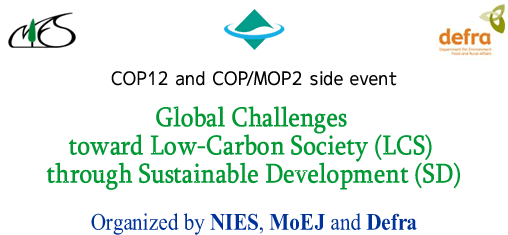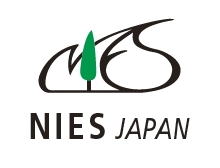 |
| Agenda: PDF |
MS WORD |
| |
| Programme |
| 11:15-12:45, November 8, 2006 |
| Acacia in World Agroforestry Center (ICRAF) |
| United Nations Office at Nairobi (UNON) |
| |
| * All Slides are compressed in ZIP file. (PDF 3.5 MB )
( PPT 7.2 MB ) |
| Opening Remarks |
11:15-11:20 |
Opening Remarks
Ryutaro Yatsu (MoEJ) |
| Key-note speech |
11:20-11:30 |
Aligning climate change and sustainable policies
Prof P.R. Shukla (Indian Institute of Management, India)
|
| 11:30-11:40 |
Modeling LCS to identify trend-breaking options
Dr. Junichi Fujino (NIES, Japan)
|
| 11:40-11:50 |
National and global cooperation to achieve LCS thourgh SD
Mr. David Warrilow (Defra, UK)
|
| Panel discussion |
11:50-11:55 |
Objectives of LCS through SD
Dr. Shuzo Nishioka (NIES, Japan), Coordinator
|
| 11:55-12:00 |
SD-PAMs
Mr. Stanford Mwakasonda (University of Cape Town, South Africa)
|
| 12:00-12:05 |
Renewable energy
Mr. Martin Weiss (Federal Environmental Agency, Germany)
|
| 12:05-12:10 |
Technology RD&D
Dr. Jiang Kejun (Energy Research Institute, China)
|
| 12:10-12:45 |
Panel discussion |
|
| |
| Key messages : |
| |
1) Aligning climate change & sustainable development actions can reduce
the burden and facilitate transition to stabilization of climate change. |
| |
2) A variety of tools and methods (eg backcasting methodologies) are
required to explore pathways including policy scenarios and options toward LCSs. |
| |
3) Cooperation for LCS involves a long policy horizon framework,
a wider range of domestic and international actors, and issues
and a comprehensive range of technologies and policy measures.
There is a need for stronger political leadership and policy signals,
both at domestic and international levels. |
|
| |
Japan – UK Joint Research Project
"Developing Visions for a Low-Carbon Society through Sustainable Development" |
| |
The Ministry of the Environment of Japan (MoEJ) and the Department for Environment,
Food and Rural Affairs in the UK (DEFRA) are jointly promoting a scientific research project:
Developing visions for a Low-Carbon Society through sustainable development. They will promote
studies toward achieving a Low-Carbon Society (LCS) by 2050 in collaboration, encourage other
countries to engage in LCS studies, and jointly hold series of international workshops.
The first workshop was held in 2006 in Tokyo.
The joint research project will use a top-down or back-castingEapproach to identify
what is required over the long term to realize stabilization of global temperatures.
The vision of a Low-Carbon Society will be described along with the scale of cuts required in GHG
emissions compared to current levels. The project intends to identify what can be done now and in
the future by summing up concrete actions and innovations needed, in terms of legal/social systems,
technologies, and life-styles. It is intended to cover studies on the requirements of people living in the 2050 world,
as well as studies on various aspects of LCS including energy supply, structure of industry, structure of cities and
countryside, and transportation systems.
Executive Summary and Workshop Summary for 1st LCS workshop are:
1st LCS workshop: Go to the 1st LCS workshop page |
|
| |
| Agenda: PDF | MS WORD
|






